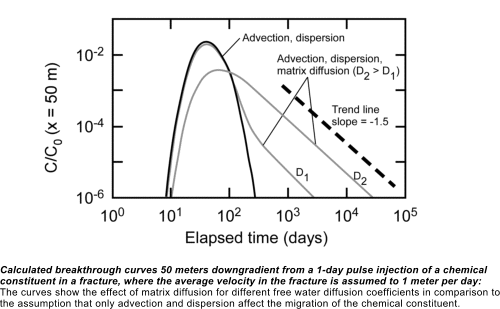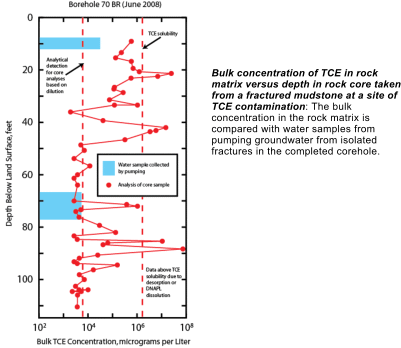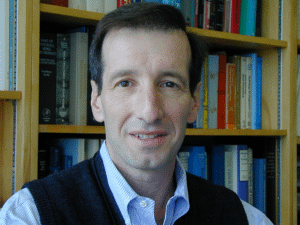On-Demand Webinars
ALTERNATIVE ENDPOINTS IN ADDRESSING REMEDIAL ACTIONS:
at Sites of Ground Water Contamination
Alternative endpoints are more relevant today than ever in achieving closure at sites of groundwater remediation. US EPA recently released a Draft Groundwater Remedy Completion Strategy on October 29, 2013. (US EPA is requesting comments on this draft strategy through December 20, 2013.)
The important new draft strategy recognizes that many sites of groundwater restoration experience conditions where remedies are not demonstrating progress to achieving remedial goals. In today's financial environment, the expenditure of resources in groundwater remediation that show diminishing returns needs to be re-evaluated. The goals of the draft strategy are strongly tied to the discussions of alternative endpoints and alternative strategies that currently exist in regulatory cleanup programs.
The important new draft strategy released by US EPA will be included in the discussion of alternative endpoints in this webinar by one of the key individuals leading the development of this landmark change: Allen Shapiro, PhD.

Alternative endpoints that are permitted under various regulatory programs will be presented along with a series of case studies that have illustrated their application.
At sites of groundwater contamination that face technical limitations, it is now necessary to consider alternatives to achieving drinking water standard that are still protective of human health and the environment. Regulatory guidelines exist under cleanup programs such as the CERCLA and the RCRA that permit alternatives to achieving drinking water standards.
Discover new trends in alternative remedial goals and endpoints that are permitted by regulations and are still protective of human health and the environment. These alternative endpoints include (among others) waivers of Technical Impracticability (TI); waivers to Applicable or Relevant and Appropriate Requirements (ARARs); groundwater management and containment zones; Alternative Concentration Limits (ACLs); and Monitored Natural Attenuation (MNA) over long time frames.
Webinar Highlights Include:
- Alternative endpoints under regulatory programs that are still protective of human health and the environment
- The hydrogeologic and geochemical complexities that have limited our ability to achieve drinking water standards at sites of groundwater contamination
- Key interpretations of remedial actions that are regulated under various cleanup programs
- Case studies demonstrating the application of alternative endpoints to groundwater remediation
You will benefit from this webinar by:
- Discovering the key constraints and possible alternative endpoints under groundwater cleanup programs in achieving remedial goals
- Learning to recognize the technical limitations that are faced in achieving drinking water standards at sites of groundwater contamination

Instructors Bio
Allen M. Shapiro, Ph.D
U.S. Geological Survey
 Dr. Allen Shapiro has authored numerous papers on field investigations in karst and various types of fractured rock aquifers, including investigations of chemical transport and matrix diffusion. Dr. Shapiro has also been active in the development of methods of quantifying properties that govern groundwater flow and chemical transport in fractured rock aquifers and he has patented equipment to conduct aquifer tests and monitor groundwater chemistry in fractured rock. Dr. Allen Shapiro has authored numerous papers on field investigations in karst and various types of fractured rock aquifers, including investigations of chemical transport and matrix diffusion. Dr. Shapiro has also been active in the development of methods of quantifying properties that govern groundwater flow and chemical transport in fractured rock aquifers and he has patented equipment to conduct aquifer tests and monitor groundwater chemistry in fractured rock.
Dr. Shapiro is a Senior Research Hydrologist with the National Research Program (NRP) of the U.S. Geological Survey (USGS). His research has focused on the development of field techniques and equipment, and methods of integrating and interpreting geologic, geophysical, hydraulic, and geochemical information in the characterization of fractured rock aquifers. Dr. Shapiro has described fundamental processes of ground water flow and chemical transport that are unique to geologic environments characterized by significant heterogeneity. He has also investigated the effect of scale on the hydraulic and transport properties of fractured rock through carefully designed field testing and modeling investigations conducted over physical dimensions of meters to kilometers. Dr. Shapiro is currently active in the characterization and remediation of various contaminants in fractured rock, including groundwater contamination by Dense Non-Aqueous Phase Liquids (DNAPLs).
Dr. Shapiro was the 2004 National Ground Water Association (NGWA) Distinguished Darcy Lecturer and is an associate editor of the journal Ground Water, and he holds a Ph.D. from Princeton University in Civil and Geological Engineering.
| Fee: |
299.00 USD Per Webinar
|
| Materials and Downloads: |
Session Slides (PDF)
Record of Attendance Form (PDF)
|
Number of
Participants: |
AS OF JUNE 1, 2020, WEBINARS ARE PRICED FOR INDIVIDUALS WORKING ALONE. Pricing is discounted for individual registrations for people working alone.
|
Continuing
Education
Certificates: |
$14.95 each. Official CEU certificates are available as an option. After successful completion of this webinar, a link will be provided to order a certificate.
|
| Access: |
On-demand, anytime 24/7. |
| Discounts: |
Buy 3 on-demand webinars, and get 3 on-demand webinars for free!
|
| Duration: |
90 minutes |
| PDH Earned: |
1.5 hours |
| |
|
| Instructor(s): |
Allen M. Shapiro, Ph.D |
|
Become A Member
It's Free, It's Easy and as a
Member you'll enjoy...
- Exclusive Videos
- Special Pricing
- And Much More
|
|
Join
|
Learn More
|
Association of Environmental
& Engineering Geologists
|